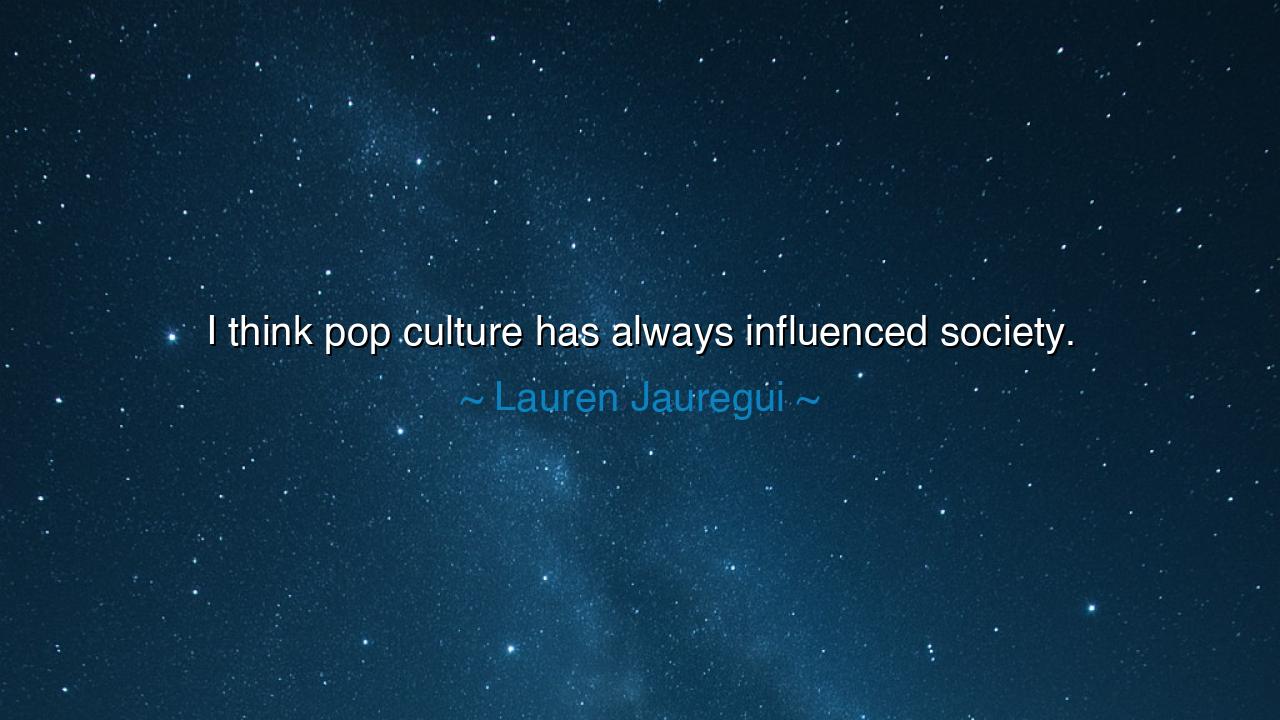
I think pop culture has always influenced society.






Hear now the words of Lauren Jauregui, a singer raised in the currents of modern art, who declared: “I think pop culture has always influenced society.” Though simple in phrasing, these words carry the weight of ages, for they remind us that the stories, songs, fashions, and images of a people are never idle ornaments. They are living currents that shape the very spirit of their society, guiding how people see themselves, how they dream, and how they act.
For what is pop culture but the shared voice of the age, rising through music, film, books, and symbols? It reflects the anxieties, hopes, and desires of a generation. Yet more than reflecting, it shapes. When young people wear the styles of their idols, when families gather to watch the same stories, when nations hum the same songs, the collective imagination is molded. Thus, Jauregui speaks truly: society bends to the influence of its culture, just as rivers are carved by the winds and rains of time.
History provides us with examples bright as stars. In the 1960s, the songs of Bob Dylan, Joan Baez, and the Beatles did not merely entertain—they fueled the spirit of change. They gave voice to movements against war, for civil rights, for freedom of expression. What lawmakers debated in chambers, the people felt in their hearts through pop culture. It was music, clothing, and art that carried the fire of protest into every corner, shaping society into one more aware of justice and peace.
Yet this truth is older still. In the days of ancient Greece, the plays of Euripides and Aristophanes stirred public thought, mocking the follies of the powerful and awakening questions about war, democracy, and morality. The Roman people were shaped by the spectacles of the Colosseum, for better and for worse. Thus, whether in ancient theaters or modern stages, in painted frescoes or on glowing screens, culture has always held the power to guide the minds of the people.
But Jauregui’s words also carry a warning. If pop culture holds such power, then its influence may heal or harm. It may lift a generation toward courage, kindness, and solidarity—or it may lure them toward vanity, greed, and despair. When society worships shallow images or cruel messages, it risks corrupting itself. Thus, the guardians of art, whether musicians, writers, or creators, bear a great responsibility. They are not merely entertainers, but teachers of the heart, architects of the collective dream.
The lesson, O listeners, is this: attend carefully to the culture you consume and create. Do not dismiss it as harmless distraction, for it shapes you more than you know. Support works that uplift, that tell truth, that inspire justice. Guard your heart against those that degrade or belittle life. And if you are a creator, wield your voice not only for fame but for the good of the world. For every song sung, every story told, every image shared carries the seed of influence, for blessing or for curse.
Therefore, take Jauregui’s wisdom to heart: “Pop culture has always influenced society.” Let us then not drift blindly in its currents, but steer them toward light. For a people who cherish beauty, truth, and compassion in their shared culture will see these same virtues bloom in their society. And a people who consume poison will surely find their spirits weakened. Choose wisely, O children of tomorrow, for in your culture lies the shaping of your destiny.
Thus remember: culture is power, and power is responsibility. Let your art, your stories, your voices, be rivers of life flowing into society, nourishing justice, compassion, and hope. In this way, you will not only reflect the age in which you live, but transform it into something brighter for the generations yet to come.






AAdministratorAdministrator
Welcome, honored guests. Please leave a comment, we will respond soon